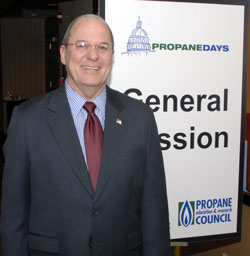 This morning I met with the President/CEO of the Propane Education & Research Council, Roy Willis. He was on hand at the sessions taking place for the 3rd Annual Propane Days here in Washington, DC. Roy says PERC’s goal here is to help educate policy makers so that they make good decisions based on sound science and research.
This morning I met with the President/CEO of the Propane Education & Research Council, Roy Willis. He was on hand at the sessions taking place for the 3rd Annual Propane Days here in Washington, DC. Roy says PERC’s goal here is to help educate policy makers so that they make good decisions based on sound science and research.
I asked him to highlight some of their projects that he is especially proud of in the area of agriculture. They include what he calls thermal cultivation which is using heat/steam/flame to control pests in a variety of farm applications. He says this has a special interest to anyone growing organically since it reduces or eliminates the need for chemicals. Irrigation done with propane powered engines is another area that he mentioned as well as safety programs geared to agricultural audiences. He also mentioned that discussions are underway to see how propane can be used in tractors and combines.
One of the things I aske him about was where this fuel comes from. I think a lot of people wonder that. You see that’s it’s widely available but where do we get propane? To start with it’s a naturally occurring hydrocarbon that we mainly get as a by-product of the natural gas or oil refining processes. He says that over 90 percent of our propane comes from these sources which are domestic. Another area that holds promise includes bio-propane which would be made from a biomass production process. PERC is actively involved in this work with a project in Japan. One thing he wants people to know is that propane represents a very sustainable supply of fuel now and in the future.
You can listen to my interview with Roy here: [audio:http://www.zimmcomm.biz/propane/propane-days-07-willis.mp3]
Roy ended our discussion by saying that the slogan, “Exceptional Energy,” is taken by PERC as a promise to their customers and a challenge to the staff to deliver a superior, safe product.

